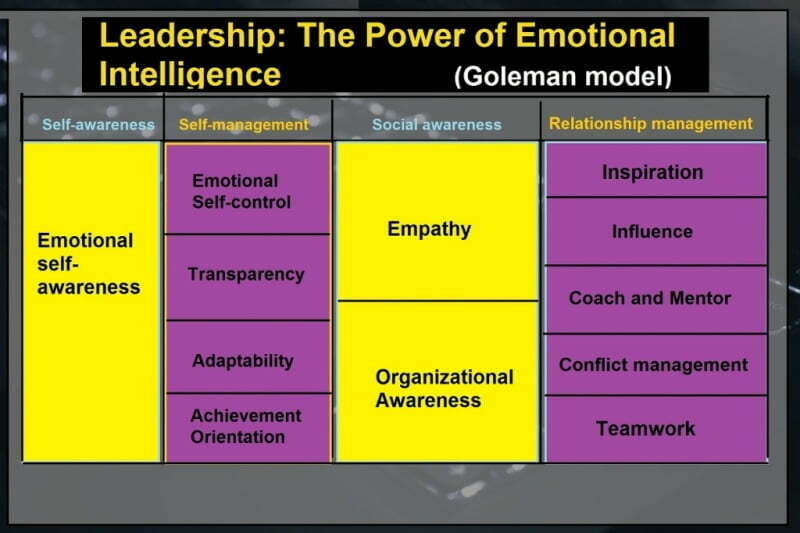Leadership: The Power of Emotional Intelligence by Daniel Goleman
The Power of Emotional Intelligence by Daniel Goleman:
Emotional intelligence is that disposition that allows us to take control of our emotional impulses. Understanding the deepest feelings of our fellow men, graciously handling our relationships, or developing what Aristotle called the rare ability to “get angry at the right person, to the right degree, at the right time, for the right purpose, and in the right way.”
According to Daniel Goleman, Emotional intelligence and technical skills are important, but IQ is the sine qua non of leadership, as I mentioned in the previous article: “Emotional intelligence brings humanity back to leadership.”
Emotional intelligence is understood as the proper understanding and management of emotions that trigger the effectiveness of leadership.
The leader has the fundamental task of awakening the positive feelings of his collaborators: inspiration, enthusiasm, and motivation… This climate is the most conducive for people to develop their talent and bring out the best they have inside.
Daniel Goleman’s Model of Emotional Intelligence:
The Daniel Goleman model focuses on behavior, job performance, and leadership in organizations. It has two main competencies (personal and social), which give rise to four domains (self-awareness, self-management, social awareness, and relationship management), which in total include eighteen associated capacities.

Leadership: The power of emotional intelligence (Daniel Goleman Model)
1. Self-Awareness:
Emotional self-awareness. Leaders with a good level of emotional self-awareness connect with their internal cues and recognize the effect of their feelings about themselves and their work performance. They are in tune with their values. They are sincere and authentic, speak openly about their emotions, and easily express what they feel inside.
Adequate self-assessment: The leader recognizes his strengths and weaknesses and even laughs at himself, admits feedback as a gift to learn the things to improve, and knows when to ask for help, and where to focus on learning new soft skills of leadership.
They have a characteristic trait. They are continuous learners and teach their collaborators how to improve their capabilities.
Conking on oneself: Familiarity with their abilities makes them take full advantage of their strengths. They are people who also take on complex tasks. Self-confidence makes them stand out in any group. It’s that strong positive feeling of self-worth.
2. Self-Management
Self-control. Leaders who have the capacity for emotional self-control know how to manage and channel their emotions properly. One of the traits that define them is serenity and clarity to face stressful crises, and the ability to keep disruptive emotions and impulses under control.
Transparency. Transparent leaders are true to their values. Transparency is authentic openness to others regarding how you feel what you believe and what you do, this enables integrity. They are open to admitting their mistakes and do not overlook the unethical behavior of others, they pretend not to notice but instead confront it.
Adaptability. Leaders with this ability to adapt can juggle different tasks without losing energy or concentration. They demonstrate flexibility, versatility, and agility to adapt to new challenges, and unexpected changes as we live in the current VUCA environment and they have no problem changing their opinion when the new change, in reality, demands it.
Achievement. Leaders with this ability have their values very well defined. They have that personal ambition, that personal challenge to continually improve, and also seek the improvement of their collaborators so that they always seek the best result for themselves and their team. They have a standard of achieving excellence internally. Leadership sets challenging, demanding, measurable, and achievable S.M.A.R.T. goals to make them worthwhile.
Leaders with this ability have the character trait of being continuous learners and teaching their collaborators how to improve.
Initiative: Leaders with a high sense of effectiveness are excellent in this competition.
Self-efficacy can be defined as an individual’s belief in his or her capacity to execute behaviors necessary to produce specific performance attainments. Albert Bandura
Self-efficacy reflects confidence in the ability to exert control over people’s own motivation, behavior, and social environment. They are people who do not wait for opportunities to present themselves but take advantage of and create them.
Optimism. Optimistic leaders accept things as they come and when they are presented with a setback they perceive an opportunity and not a threat. They have a positive conception of others, of whom they expect the best. They see the glass half full, and they hope that the changes that the immediate future brings will be for the better.
3. Social Conscience:
Empathy. Empathic leaders can connect with a wide range of emotional signals that allow them to experience the emotions that a person or a group feels. They know how to listen carefully and understand the perspective of others. Thanks to empathy, a leader can get along well with people of diverse origins or different cultures. In this sense, empathy that allows one to tune into the subtleties of body language and help to listen to the emotional message transmitted on a non-verbal level constitutes the best antidote to the interpretation problems that often threaten intercultural dialogue.
Organizational Awareness. Leaders with a good social conscience can be astute in the political arena, can be aware of decision-making networks, and can understand the political forces that operate in a company, as well as the values and rules that apply.
Service. Leaders with a high capacity for service know how to generate the appropriate emotional climate to establish a good relationship with the internal or external client to take the relationship on the right track and thus ensure that they have everything they need and of course, they are also always available what they are needed.
4. Relationship Management:
Inspiration. Leaders who inspire create resonance, that is, the positive emotional climate essential to mobilize the best of the human being, they drive people with clear and convincing visions that are highly motivating. They transmit, beyond day-to-day tasks, the feeling that everyone works for the same goal, a common goal with which the activity will always be more attractive, turning work into something stimulating.
Influence. They are compelling and seductive people when addressing a group. They can adapt to each interlocutor, know how to surround themselves with people and the key support network to carry out each initiative, and of course, they are committed and highly persuasive people in the direction of groups and teams.
Development personnel others. Leaders with a good hand to cultivate the capacities of others show a sincere interest in people, and in their collaborators, they know how to understand their objectives, strengths, and weaknesses, and they know how to give timely and constructive feedback. They are excellent mentors and coaches by nature.
Ability to drive change. Leaders recognize the need for change, they question the status quo, they champion change, and they support it with conviction even when great obstacles are encountered. They argue their opinions very well. They encourage, promote, and steer change in a new direction.
Conflict management. Leaders know how to listen to all parties, understand different points of view, and find a common ideal that everyone can defend. They bring the conflict to the surface, collect the feelings and opinions of everyone involved, and then redirect energy towards a common ideal so that they can make the best of every situation. They, therefore, can negotiate and resolve disagreements by orchestrating resolutions.
Teamwork and collaboration. Leaders capable of teamwork create an atmosphere of harmony, of friendly collaboration.
They are persons…
- With a model of respect, attention, cooperation, of utility.
- That combines active commitment with a collective effort to build harmony and identity and that
- They invest time in forging and cementing close relationships that go beyond mere work obligations and also…
- They cooperate and create teams. They encourage esprit de corps (loyalty and pride towards unity).
Conclusion:
Emotional intelligence allows us to become aware of our emotions, understand the feelings of others, tolerate the pressures and frustrations we endure at work, accentuate our ability to work as a team and adopt an empathic and social attitude, which will give us greater possibilities for personal and professional development.
Emotions play a central role in the set of skills necessary to live and everyday organizations place more emphasis on stimulating emotional intelligence to achieve job success. On the other hand, toxic emotions can be as dangerous to physical health as tobacco, while emotional balance contributes, on the contrary, to protect our health and well-being.
You may also like:
The Disadvantages of Social Media Networks
